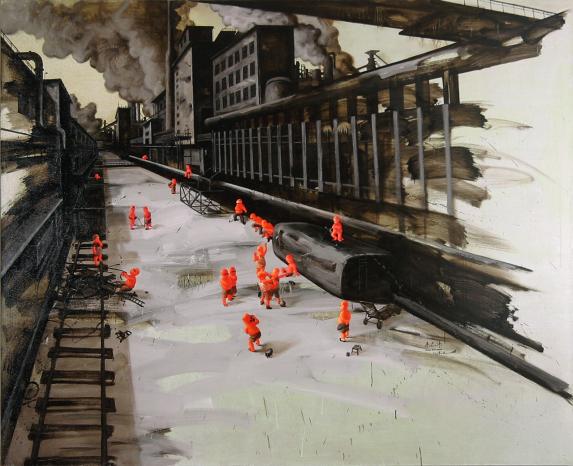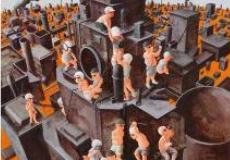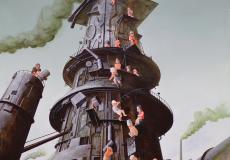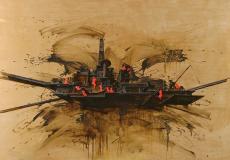Zhu Zhiwei’s paintings dwell on the incredible scale of China’s industrialization, and the relationship between modern city dwellers and the man-made environment that they inhabit. Paradise: Wrestling depicts an industrial site of gigantic proportions. A long, wide alley is situated between two rows of factory buildings, which all recede into the distance. Despite its large proportions, there is a certain sense of enclosure; thick pillars of smoke clog the sky in the background, and a large walkway in the upper-right corner connects these rows of the buildings.
The entire composition is saturated by monotonous gray hues, with the sole exception of the neon-orange figures that dot the painting. These small figures further amplify the scene’s enormous scale, and appear engulfed by their industrial surroundings. The action is concentrated to the front right section of the composition, where two figures engage in a wrestling match. Judging by the crowd that encircles them and the photographer in front, the fight is planned rather than spontaneous. Although one spectator raises his arms in what appears to be sincere enthusiasm, the others either watch passively or ignore the scene all together. The purpose or intent of their various activities is quite ambiguous. A sunglasses-wearing figure to the left appears to be destroying discarded pieces of machinery. Slightly behind him is a figure wearing a tire around his waist, which is being inflated by a companion. Meanwhile, a figure towards the back of the composition holds what appears to be a large iron ball, while two others in the distance climb across pieces of machinery.
Perhaps most mysterious of all is the figure that stands on the block in the right corner of the painting; he is distinguishable from his companions by his monkey mask, cape, and staff. These attributes suggest an allusion to the Monkey King—the mischievous hero from the Chinese classical novel Journey to the West. Distanced from the other figures with crossed arms, he seems to survey the games and pursuits of his companions with a sense of superiority.
A word from The Artist
Industrialization is the main theme of my work; the background of which is like a jigsaw puzzle - an arrangement comprising all sorts of elements. I am interested in the people’s lifestyle and their feelings of nostalgia in the midst of large-scale industrialized production. Images of child-like figures living an ordinary life in giant factories epitomize the incongruities and absurdities of contemporary life amidst the high-speed development of China’s cities. The factories that we build with our own knowledge and sweat propel our economic progress, but In front of these factories, individual people appear insignificant and powerless. Each viewer brings his own complex associations and recollections into the world that I have constructed.
My works often contain simultaneously real and imaginary industrial elements, as well as rich scenes of everyday life. All of these the thoughts and images originate from my own ordinary life. Anxiety and uneasiness, absurdity and panic, confusion and grievance, hope and despair can all be found in my works.
With steel and concrete structures as homes, in an increasingly industrialized landscape, the whole world has become distorted beyond recognition.
Paradise: Wrestling
天堂:角力
By ZHU Zhiwei
由朱志伟创作
Prints are created with archival-quality pigment inks and 100% cotton rag acid-free paper.
Each print comes with a certificate of authenticity numbered and signed by the artist.
Dimensions are for the size of the paper on which the image is printed - not the image itself. All prints have a white border to allow for framing.
Revenues from each purchase are shared with the artist.











